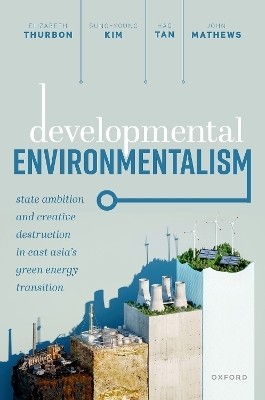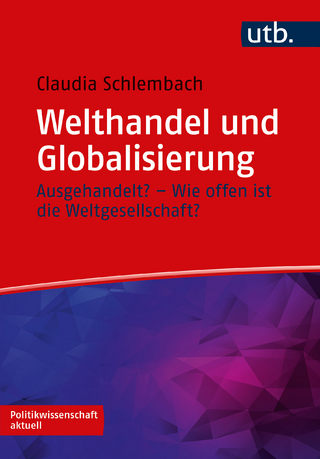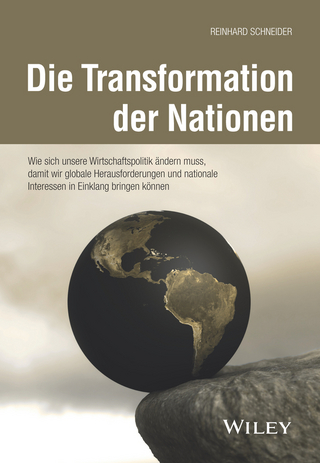
Developmental Environmentalism
Oxford University Press (Verlag)
978-0-19-289850-0 (ISBN)
Why has East Asia emerged as the global leader in green energy industries but - until recently - lagged on carbon emission reduction? What is new and distinctive about East Asia's approach to the green energy transition? And what does this approach mean for the world? Developmental Environmentalism provides the first comprehensive account of East Asia's green energy shift. It highlights the powerful and symbiotic role of state ambition, geostrategic competition, and capitalist market dynamics in driving forward the region's greening efforts. Through an analysis of the ambitious national strategies of China and South Korea, the authors show how state actors have pursued a distinctively East Asian approach to transforming their energy systems, involving first the rapid creation of new green energy industries and then the coordinated destruction of fossil-fuel incumbencies. This approach - described as 'Developmental Environmentalism' - is aimed at establishing East Asian economies as leaders in the green industries of the future, while at the same time addressing the pressing environmental, social and political problems associated with the carbon-intensive industries of the past. By developing four detailed, longitudinal case studies of green industry creation and fossil-fuel phase out in China and Korea, the authors identify the key successes and failures of East Asia's green shift to date and anticipate its most likely future trajectory.
Based on their findings, the authors reject the idea that East Asia's greening strategies are mere exercises in 'greenwashing' or fossil-fuelled 'business as usual'. Rather, there is something fundamentally transformative underway in the region at the level of elite ideation, strategic ambition, and policy action; the green energy shift represents much more than continuity in Asia's erstwhile developmental states. To execute their analysis, the authors synthesise insights from cutting-edge Developmental State and Schumpeterian theorising. They show how state actors in East Asia are engaging in a sophisticated kind of economic statecraft, strategically harnessing the capitalist market dynamics of 'creative-destruction' to advance their transformative green ambitions through green growth. They also assess the implications of developmental environmentalism for developed and developing countries, and the future of the global green shift in an era of geostrategic rivalry.
Elizabeth Thurbon is a Scientia Fellow in International Relations in the School of Social Sciences at UNSW Sydney and a Fellow of The Asia Society (2021-22). Her research focusses on the state's strategic role in techno-industrial development and change. Her most significant contributions to the field examine varieties of economic statecraft, the rise and transformation of East Asia's developmental states, and the state's strategic role in the clean energy shift. Her most recent book Developmental Mindset (Cornell University Press) offers a fresh way of conceptualizing and analysing East Asia's developmental states and examining their emergence and evolution. Sung-Young Kim is Senior Lecturer in the Discipline of Politics and International Relations, Macquarie School of Social Sciences, Macquarie University. His work is published in Energy Policy, Journal of Environment and Development, Review of International Political Economy, New Political Economy, Global Policy, Politics & Society, Review of Evolutionary Political Economy, and The Asia-Pacific Journal. His research and teaching is on the international political economy of renewable energy transitions in East Asia. He is Regional Editor (Korea) for Asian Studies Review journal and serves on the Executive Committees of the Australian Political Studies Association and the Korean Studies Association of Australasia. Hao Tan is an Associate Professor with Newcastle Business School in the University of Newcastle Australia. His research is focused on energy transitions and their global implications from management and policy research perspectives. His work has appeared in Nature, Foreign Affairs, Journal of World Business, California Management Review, Management and Organization Review, and Energy Policy. He also writes frequently for influential English and Chinese-language media outlets on issues relating to China's energy industry and climate policy. He currently serves as an Associate Editor for Technological Forecasting and Social Change, a leading academic journal in innovation studies. John Mathews is Professor Emeritus at Macquarie University, Sydney, in the Macquarie Business School. Formerly Professor of Strategy at MGSM, from 2009 to 2012 he held concurrently the Eni Chair of Competitive Dynamics and Global Strategy at LUISS University in Rome. Professor Mathews has focused recently on the strategic dynamics of greening of industry. In 2017 he published Global Green Shift with Anthem Press in London. In July 2018 Professor Mathews was awarded the biannual Schumpeter Prize in recognition of his work and most recent book. The four authors of Developmental Environmentalism won the Review of Evolutionary Political Economy Best Paper Award 2022/2023.
1: Cutting Through the Conflicting Images of East Asia's Green Energy Shift
2: Northeast Asia's Performance in the Green Energy Shift: What Does The Data Reveal?
3: A Novel Analytical Framework
4: Creative-Destruction in Korea's Hydrogen Fuel Cell Electric Vehicle Industry
5: Creative-Destruction in China's Strong and Smart Grid Initiatives: The Shift to Ultra-High Voltage (UHV)
8: Drivers and Dynamics of Northeast Asia's Green Energy Shift: A Comparative Strategic Analysis
9: The Global Green Shift in an Era of Geostrategic Rivalry
| Erscheinungsdatum | 10.05.2023 |
|---|---|
| Verlagsort | Oxford |
| Sprache | englisch |
| Maße | 156 x 235 mm |
| Gewicht | 418 g |
| Themenwelt | Wirtschaft ► Volkswirtschaftslehre ► Wirtschaftspolitik |
| ISBN-10 | 0-19-289850-7 / 0192898507 |
| ISBN-13 | 978-0-19-289850-0 / 9780192898500 |
| Zustand | Neuware |
| Haben Sie eine Frage zum Produkt? |
aus dem Bereich


